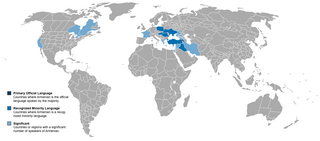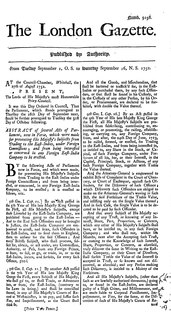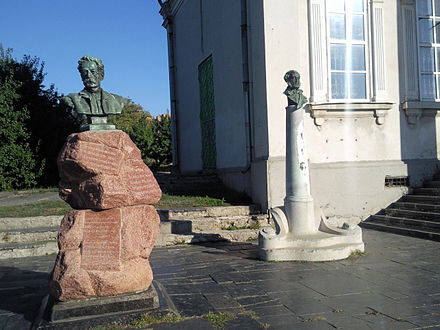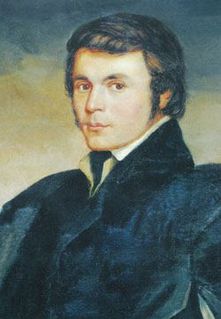
"Mer Hayrenik" is the national anthem of Armenia. Barsegh Kanachyan composed the music, while the lyrics were authored by Mikayel Nalbandian. First adopted in 1918 as the anthem of the short-lived First Republic of Armenia, it was subsequently banned after the country was invaded and incorporated into the Soviet Union. Following the dissolution of the USSR and the restoration of sovereignty in 1991, the song was re-adopted as the national anthem of the newly-independent state, albeit with slightly modified lyrics.

Grigor Narekatsi was an Armenian mystical and lyrical poet, monk, and theologian. He is a saint of the Armenian Apostolic Church and was declared a Doctor of the Church by Pope Francis in 2015.
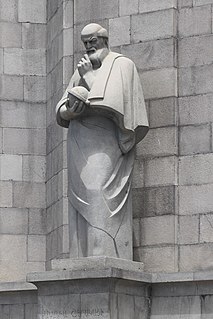
Anania Shirakatsi was a 7th-century Armenian polymath and natural philosopher. He distinguished himself as being the first Armenian mathematician, astronomer, and cosmographer. Hence, he is considered the father of the exact and natural sciences in Armenia.

Michael Hovhannisyan, known by the pen name Nar-Dos, was an Armenian writer.

Mkrtich Khrimian was an Armenian Apostolic Church leader, educator, and publisher who served as Catholicos of All Armenians from 1893 to 1907. During this period he was known as Mkrtich I of Van.

Yeghishe Charents was an Armenian poet, writer and public activist. Charents was an outstanding poet of the twentieth century, touching upon a multitude of topics that ranged from his experiences in the First World War, socialist revolution, and, more prominently, on Armenia and Armenians. He is recognized as "the main poet of the 20th century" in Armenia.

Manuk Abeghian was a scholar of Armenian literature and folklore.

The Armenian Oblast or Armenian Province was an oblast (province) of the Caucasus Viceroyalty of the Russian Empire that existed from 1828 to 1840. It corresponded to most of present-day central Armenia, the Iğdır Province of Turkey, and the Nakhichevan exclave of Azerbaijan. Its administrative center was Erivan (Yerevan).
Smbat Shahaziz was an Armenian educator, poet and publicist.
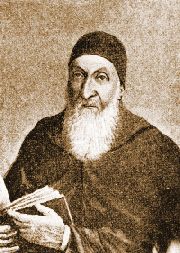
Mikayel Chamchian, known also in English as Michael Chamich, was an Armenian Mekhitarist monk and historian. He is best known for writing a comprehensive and influential history of Armenia in three volumes, which has remained a reference for scholars since the time of its publication.

Raphael Patkanian was one of the most popular Armenian poets.
Modern Armenian is the modern vernacular (vulgar) form of the Armenian language. Although it first appeared in the 14th century, it was not until the 18-19th centuries that it became the dominant form of written Armenian, as opposed to Classical Armenian. It has two standardized forms: Western Armenian and Eastern Armenia, mostly spoken—in the 19th century—in the Ottoman and Russian empires, respectively.
Harutiun Svadjian, was a famed Armenian writer, political activist, teacher, and considered one of the founders of Armenian political humorist literature.

Mikayel Nalbandian Shirak State University, is a public university in Gyumri, the capital of Shirak Province, Armenia, opened in 1934.

Wounds of Armenia is an 1841 historical novel by Khachatur Abovian. Written in the Araratian (Yerevan) dialect, Wounds of Armenia is considered Abovian's chef d'œuvre. It is Abovian's debut novel, the first Armenian novel and the first modern Eastern Armenian literary work. Thanks to Wounds of Armenia, Khachatur Abovian is acknowledged as the founder of the modern Eastern Armenian language.
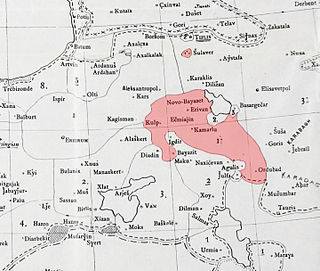
The Yerevan dialect is an Eastern Armenian dialect spoken in and around Yerevan. Classical Armenian (Grabar) words compose significant part of the Yerevan dialect vocabulary. Throughout the history, the dialect was influenced by several languages, especially Russian and Persian and loan words have significant presence in it today. It is the most widespread Armenian dialect today.

